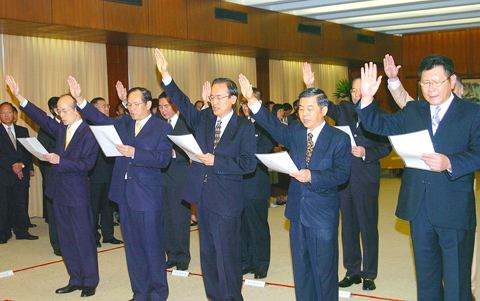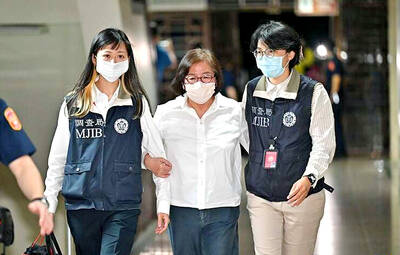Minister of Foreign Affairs Francisco Ou (歐鴻鍊) yesterday approved John Feng (馮寄台) as the next representative to Japan, saying Feng is the ideal candidate because he has the trust of President Ma Ying-jeou (馬英九).
“Feng was educated in Japan for several years. He has a strong foundation in the Japanese language and I believe he will establish contacts very fast once he arrives in Japan,” said Ou, adding that the most important characteristic for a representative was the ability to convey the president’s message clearly and accurately.
The Ministry of Foreign Affairs announced Feng’s appointment on Tuesday night, nearly 40 days after the seat was left vacant by Koh Sei-kai (許世楷), a renowned Japan expert who resigned in the midst of the Diaoyutai incident in June.

PHOTO: CHIEN JUNG-FONG, TAIPEI TIMES
Feng, a member of the Chinese Nationalist Party (KMT) and a longtime trusted aide to Ma, served as ambassador to the Dominican Republic and as the ministry’s chief of protocol. He was also director of international affairs for Ma’s campaign in the presidential race.
The ministry said Feng, 61, completed several years of primary and secondary education in Japan while his father was serving as a diplomat. He later obtained a master’s degree in public relations from Harvard University.
Asked about Japan’s opinion on Feng’s appointment, ministry spokesman Henry Chen (陳銘政) held up his thumb and said the Japanese were very pleased.
Asked for comment, KMT Legislator Lee Hung-chun (李鴻鈞), who just returned from a trip to Japan with Legislative Speaker Wang Jin-pyng (王金平) last Wednesday, lauded Ma’s choice.
Lee said that Feng’s experience in diplomacy and his proficiency in Japanese made him a good candidate to be the nation’s representative to Tokyo.
Lo Fu-chen (羅福全), a former representative to Japan, however, was reserved in his assessment on Feng’s appointment, saying Feng’s unfamiliarity with the Japanese cultural and political scene could impede the development of relations with Japan.
“Japan is one of Taiwan’s most important friends. We must not take the position lightly. Feng has an arduous task ahead of him because he lacks the necessary familiarity with the Japanese society, cultural and political climate,” Lo said.
Moreover, he said, unlike his predecessors, Feng is virtually unheard of in Japan.
In related news, Premier Liu Chao-shiuan (劉兆玄) yesterday expressed hope that Taiwan would enhance economic and trade exchanges with Japan, and that businesses from the two countries would work together to tap Chinese market.
Liu made the remarks while receiving Saito Masaki, the new chief representative of the Japan Interchange Association Taipei Office, in the Executive Yuan.
Liu said the government believed improving cross-strait relations would bring peace and prosperity to East Asia and that cooperation between Japanese and Taiwanese businesses on the Chinese market would lead to a win-win-win situation.
ADDITIONAL REPORTING BY FLORA WANG AND SHIH HSIU-CHUAN

Costa Rica sent a group of intelligence officials to Taiwan for a short-term training program, the first time the Central American country has done so since the countries ended official diplomatic relations in 2007, a Costa Rican media outlet reported last week. Five officials from the Costa Rican Directorate of Intelligence and Security last month spent 23 days in Taipei undergoing a series of training sessions focused on national security, La Nacion reported on Friday, quoting unnamed sources. The Costa Rican government has not confirmed the report. The Chinese embassy in Costa Rica protested the news, saying in a statement issued the same

Taiwan is to extend its visa-waiver program for Philippine passport holders for another year, starting on Aug. 1, Minister of Foreign Affairs Lin Chia-lung (林佳龍) said on Friday. Lin made the announcement during a reception in Taipei marking the 127th anniversary of Philippine independence and the 50th anniversary of the establishment of the Manila Economic and Cultural Office (MECO) in Taiwan, the Ministry of Foreign Affairs said. The decision reflected Taiwan’s commitment to deepening exchanges with the Philippines, the statement cited Lin as saying, adding that it was a key partner under the New Southbound Policy launched in 2016. Lin also expressed hope

Temperatures in New Taipei City’s Sindian District (新店) climbed past 37°C yesterday, as the Central Weather Administration (CWA) issued heat alerts for 16 municipalities, warning the public of intense heat expected across Taiwan. The hottest location in Taiwan was in Sindian, where the mercury reached 37.5°C at about 2pm, according to CWA data. Taipei’s Shilin District (士林) recorded a temperature of 37.4°C at noon, Taitung County’s Jinfeng Township (金峰) at 12:50 pm logged a temperature of 37.4°C and Miaoli County’s Toufen Township (頭份) reached 36.7°C at 11:40am, the CWA said. The weather agency yesterday issued a yellow level information notice for Taipei, New

CASE: Prosecutors have requested heavy sentences, citing a lack of remorse and the defendants’ role in ‘undermining the country’s democratic foundations’ Five people affiliated with the Chinese Nationalist Party (KMT), including senior staff from the party’s Taipei branch, were indicted yesterday for allegedly forging thousands of signatures to recall two Democratic Progressive Party (DPP) lawmakers. Those indicted include KMT Taipei chapter director Huang Lu Chin-ru (黃呂錦茹), secretary-general Chu Wen-ching (初文卿) and secretary Yao Fu-wen (姚富文), the Taipei District Prosecutors’ Office said in a news release. Prosecutors said the three were responsible for fabricating 5,211 signature forms — 2,537 related to the recall of DPP Legislator Wu Pei-yi (吳沛憶) and 2,674 for DPP Legislator Rosalia Wu (吳思瑤) — with forged entries accounting for